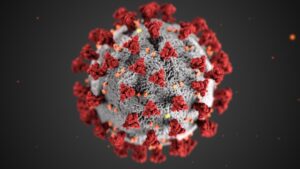Most people think of infections as something that happens acutely, and that’s for good reason; common viruses, like those that cause common cold or a stomach virus, have a distinct beginning and an end. You become ill, suffer for a few days, and recover.
However, some people suffer from chronic infections. In these cases, the pathogenic organism(s) persists – often in spite of or hidden from our immune systems – and contribute to diminishing health over time.
The common viruses that can contribute to this are Cytomegalovirus (CMV), Epstein-Barr Virus (EBV), parvovirus, and others from the Herpes family of viruses.
As opposed to bacteria, viruses are living, metabolizing, and act like genetic machines that replicate and float in the body. They are sneaky and possess a keen sense of survival.
How Does Your Body Normally Fight These Viruses?
The body has in-built immune responses to fight invaders through stomach acid, intact skin and mucus membrane or through specific proteins that kill a virus. If the immune response under-functions, the virus can get to the cells, hijack the DNA, and start to replicate itself. Just like animals and plants replicating themselves, viruses start replicating inside the body and cause viremia.
Why Do Only Certain People Suffer From Chronic Viral Infections?
People respond to viruses very differently. In the majority of the population, an early onset of exposure may develop symptoms similar to having a cold or flu, which could normally run a course of two weeks. A robust immune system produces a nice acute immune response that allows the complete clearing of the virus from the system.
A second group of people might present differently than those described above. These people may be able to produce an acute response in the beginning, but it may not be sufficient to completely clear the virus.
Unlike the above two, a third category of people may not be able to produce any immune response to a virus which could be the result of a weakened immune system or other coexisting conditions.
When there is inadequate clearing of the organism from the system, the organism tends to remain dormant in tissues or organs. If there are periods of physical or emotional stress and trauma, the virus begins to re-activate and replicate causing unusual tiredness or fatigue. This set of people can develop bigger problems leading to chronic illness in the future. Emerging research supports the idea that persistent underlying viral infection, especially from the Epstein-Barr Virus, is at the root of many chronic ailments in autoimmunity-SLE, MS, and other chronic illness.
Do Viruses Cause Inflammation and Pain?
The uncleared viruses in the system might be noticeable by the immune system at times, which then decides to mount a war. However, the immune response may not be enough to mount a real attack on the invaders which as a result can instead cause inflammation. The slow ongoing inflammatory response leads to aggravation which can then affect muscles and joints. The individual may notice increasing ongoing fatigue at this time. A healthy person might even present with pain in certain already-injured joints and adhesions. In a chronically-ill person with existing conditions like autoimmunity, Fibromyalgia or Lyme Disease, will experience increased pain throughout the body including prior-injured joints. An Autoimmune disease doctor can help you investigate the cause of your inflammation and chart a path towards recovery.
Our bodies also have compensatory mechanisms through adrenal and other hormones that allow for unnoticeable pain and fatigue for periods of time. As these compensatory mechanisms begin to be exhausted and fade…Boom!! Now there is sudden onset of pain. Mitochondrial damage from the virus can result in more fatigue and susceptibility to other infections.
Joint pains from virus and bacteria present differently in otherwise healthy people and in people with chronic illness. It is important to check the thyroid, adrenals, sex hormones, and nutrient deficiencies.
Would Lab Tests Reveal Whether or Not a Virus is Causing Your Chronic Illness or Pain?
Various serum markers to different viruses can help identify active, ongoing or a past infection. In addition, your doctor will check for inflammatory markers along with a routine blood count. A throat swab might be required to rule out a strep infection. Assessment of nutrient deficiencies, thyroid, adrenal, and digestive health may be necessary.
Natural Remedies + Naturopathic Treatment of Chronic Viral Infection
Yes, conventional antivirals like Valcyclovir or Acyclovir might be useful in some cases. But rebound symptoms with these drugs are a common phenomenon.
The best thing you can do is maximize the effectiveness of our own immune response against viruses in your body.
Fortunately, Mother Nature provides an arsenal of medicinal herbs to assist the immune system against viruses. There are various botanicals that may address different systems. A combination of individualized immune-enhancing, antiviral, adaptogenic, and antioxidant herbs and nutrients provide a potent combination to fight infections. A few examples of these are Larrea, Lomatium, Licorice, Osha, cordyseps, and Siberian ginseng or antioxidant nutrients such as mixed carotenoids, Vitamin E, and alpha lipoic acid. Increased fluids, rest, and a wholesome organic diet, along with an individualized naturopathic plan to restore adrenal, digestive, and mitochondrial function along with symptom-based homeopathic treatments, can definitely provide effective healing and strengthening of the immune system.
Healing from viral infections can be a challenge; please seek help from a qualified naturopathic doctor in Singapore who can provide individual strategies that are safe, efficacious, and well-tailored to help you on your path to complete recovery and healing.



